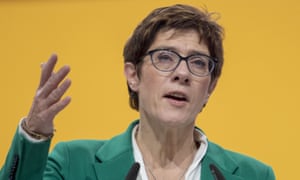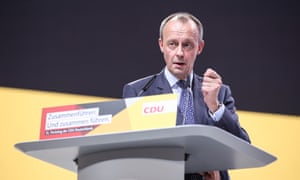Annegret Kramp-Karrenbauer beat traditionalists to become CDU leader. She would make a vocally pro-European chancellor.

‘If Annegret Kramp-Karrenbauer gets a chance, she would be a vocal leader of Germany and Europe – and less prone to silent procrastination than Merkel.’ Photograph: Thomas Lohnes/Getty Images
So Annegret Kramp-Karrenbauer – AKK, as her fans call her – is the new leader of the CDU. After her narrow victory over her rival Friedrich Merz, the tabloid Bild ran the headline: “Kramp-Karren-Power!” However, the woman who demonstrated her enduring power at the CDU party congress on Friday was not AKK, but Angela Merkel. AKK was Merkel’s choice. For the first time in postwar German history, a national leader has managed her own succession.
Konrad Adenauer and Willy Brandt were forced out by cabals. The interim figures Ludwig Erhard and Kurt Georg Kiesinger never had a chance to make their mark. Helmut Kohl and Gerhard Schröder went down to defeat in elections before being disgraced – Kohl by a party-financing scandal, Schröder by taking a job with Gazprom.
Merkel declared that she would not seek another term when her chancellorship expires in 2021, and then took a gamble by stepping down as party leader and indicating that Kramp-Karrenbauer, whom she had installed as secretary general, would be her preferred successor. If the party wanted to break with Merkel’s legacy of modernization, of making the CDU electable for urban elites, modern women and minorities, even at the expense of alienating more conservative voters, now was the time to do it.
Some disgruntled grandees decided to grab the opportunity. Ex-finance minister Wolfgang Schäuble, who had once been touted as Kohl’s successor, but who had been blindsided by Merkel, persuaded Merz to run. Merz had been ousted as leader of the party’s parliamentary faction by Merkel in the early 2000s and had spent the intervening years amassing business experience and oodles of money with the asset-management firm Black Rock. He was supported by another male victim of Merkel’s manoeuvres, Günther Oettinger. Every bit as ambitious as Schäuble and Merz, Oettinger had been shunted off to a commissioner’s post in Brussels for his pains.

Merz, then, embodied the hope – or the threat – of a return to the CDU of the Kohl era: a shift to the right in the hope of reclaiming voters who had abandoned the CDU for the far-right Alternative für Deutschland (AfD). He immediately became the darling of the right-of-centre media and the pro-business groups in the CDU. AKK, on the other hand, was the candidate of the party’s women’s and youth organisations. Women and youth versus business, the sympathetic media and the patriarchs: this would have been a no-brainer before Merkel.
Had Merz won, the pundits would now be asking how long he would need to topple Merkel. Now they are asking how long AKK will be able to keep Merkel in power. The weak point in Merkel’s coalition is the Social Democratic party (SPD), in freefall at the polls and gazing enviously at Jeremy Corbyn’s resurgent, back-to-the-70s Labour party and anxiously at the once-powerful, now marginalised French Socialist party. The SPD might jump ship at any time, and AKK might be the one to push them, in spite of herself. She told the party before her election that the days when “we executed the policies of the government” were over and that the CDU would expect the government to follow the party line.
So what could one expect from AKK as leader of Germany? Though loyal to Merkel, she’s no Merkel clone. Merkel is a Protestant from the East. AKK is a Catholic from the Saarland, wedged between France and Germany. Merkel is devoid of convictions, AKK a conservative and European. Merkel came in at the top as a token East German woman after unification; AKK slogged her way up through the ranks in the CDU’s youth and women’s organisations, fought successful elections and led governments at local and state levels – and understands what makes the party tick. Nobody doubts her capabilities. If she gets a chance, she would be a decisive – and vocal – leader of Germany and Europe and less prone to silent procrastination than Merkel.
AKK’s European options are, of course, limited by the state of the Union. Having (almost certainly) lost Britain to Brexit, Germany now seems to be losing France to the gilets jaunes. Italy, Hungary, Poland and other eastern European states are in rebellion against Brussels. Some hope that Merkel will use her new-found freedom to attempt some grand European balancing act. But with all the European heavyweights except Germany paralysed by populism, Merkel will probably revert to form and leave AKK the job of sorting out the mess.
If anyone can do it, she can. As a Catholic from a small German state, she understands subsidiarity and the resentments of smaller countries within the EU in a way Merkel the Prussian never could. As an instinctive European, she will go the extra mile to preserve the Union. Who knows, she might even find a way to entice Britain back in.
• Alan Posener, a German blogger, writes for Die Welt and Welt am Sonntag
[Disclaimer]








